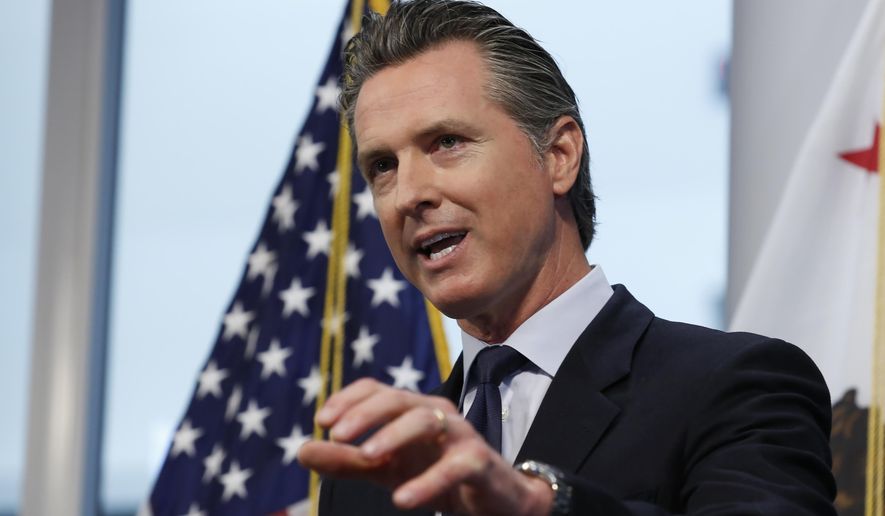SAN FRANCISCO — Citing unprecedented challenges created by the coronavirus pandemic, city officials across California are asking Gov. Gavin Newsom to suspend or delay numerous state laws, saying they’re unable to comply with everything from environmental regulations to public records laws that give people a window into how the government is spending public money.
Noting that city resources and personnel are stretched thin responding to the pandemic, the executive director of the League of California Cities asked Newsom last week to “take immediate action to pause certain statutory requirements.”
The league that represents nearly 500 cities is seeking to delay the state’s constitutionally mandated California Public Records Act, which requires transparency in government decision-making and spending. The law requires public agencies to respond to requests for information within 10 days, though many routinely take advantage of legally allowed extensions.
Spokeswoman Kayla Woods said the group is not seeking to suspend all public records requests, but wants “flexibility to cities if their ability to respond to certain PRA requests is limited due to decreased staffing or closure of city facilities.” She said the delay would be limited to records requests “other than those created during, and relating to, the COVID-19 crisis.”
“Cities have varying levels of staffing and resources, and are focusing nearly all of their efforts on responding to this public health crisis,” Woods said in an email to The Associated Press.
The danger with suspending such laws, even partially or temporarily, “is that the public won’t know and won’t have ability to oversee financial improprieties, public employee wrongdoing, fraud - myriad important aspects of the government will not be able to be seen by the public if the public doesn’t have access to public records,” said Duffy Carolan, a San Francisco attorney who represents media outlets.
The league’s request comes as governments worldwide are spending billions, often through contracts with private companies, to build emergency hospitals, acquire hotel rooms and buy much-needed personal protective equipment. In California alone, the Legislature approved $1 billion in emergency spending that will filter out to local governments.
Newsom has already waived regulations on everything from hospital staffing to school funding in sweeping executive orders. He temporarily suspended parts of the state’s open meeting laws, allowing boards and commissions to meet and vote by teleconference and exempting rules that people be allowed to speak in person.
The governor’s office did not respond to a request Tuesday from the AP asking whether he is considering any more such suspensions.
Across the U.S., governors, lawmakers, mayors and county officials have already opted to keep the public away from public meetings for the sake of health. Federal agencies have cited the crisis in refusing to respond to records requests. In California, San Francisco’s mayor suspended the city’s stringent Sunshine Law, and Fresno’s city council voted to suspend the entire California Public Records Act.
In response, 132 good government and media companies have urged governments to redouble transparency during the crisis, saying credibility is more critical than ever.
“As people are asked to make increasing sacrifices in their daily lives for the greater good of public health, the legitimacy of government decision-making requires a renewed commitment to transparency,” the groups wrote.
In response to his request for emails related to Sonoma County’s coronavirus response, county officials told Santa Rosa Press-Democrat reporter Tyler Silvy that the public’s interest “is not served by diverting staff resources away from essential emergency response work to immediately respond to records requests.” In subsequent correspondence, a county attorney told Silvy the county would process such requests when normal business resumes.
Aaron Field, a San Francisco attorney who specializes in media law and is co-chair of the Northern California Society of Professional Journalists’ freedom of information committee, noted that the California Supreme Court has said open government “is essential to the functioning of society,” so the bar for suspending such a rule - even temporarily - should be high.
“In the midst of a crisis in which the government is more involved in our daily lives than it has ever been in my memory, it’s more important than ever for public access to be preserved,” he said.
The League of California Cities requested a host of delays in its six-page letter. Woods, the league’s spokeswoman, said many city employees who would normally work on fulfilling statutory requirements “have been pulled from their regular assignments to work on these vital emergency response efforts.”
The league is requesting delays to numerous waivers and deadlines, including for construction project approvals, housing reviews and annual staff salary information. It also seeks to:
- Suspend a California law requiring public officials to file statements of economic interest that can show conflicts of interest and weighing fees for late submissions, which California’s Fair Political Practices Commission is expected to formally approve Thursday. Woods said the filing delay ensures local leaders can focus on responding to the crisis.
- Delay some parts of California’s environmental law by four months, including the need to hold timely meetings and a rule requiring California Environmental Quality Act reviews to be completed within a year.
- Cut by 25% the locally required spending on some transportation projects, which governments have previously sought to waive; and extend the deadline to approve some construction projects.




Please read our comment policy before commenting.